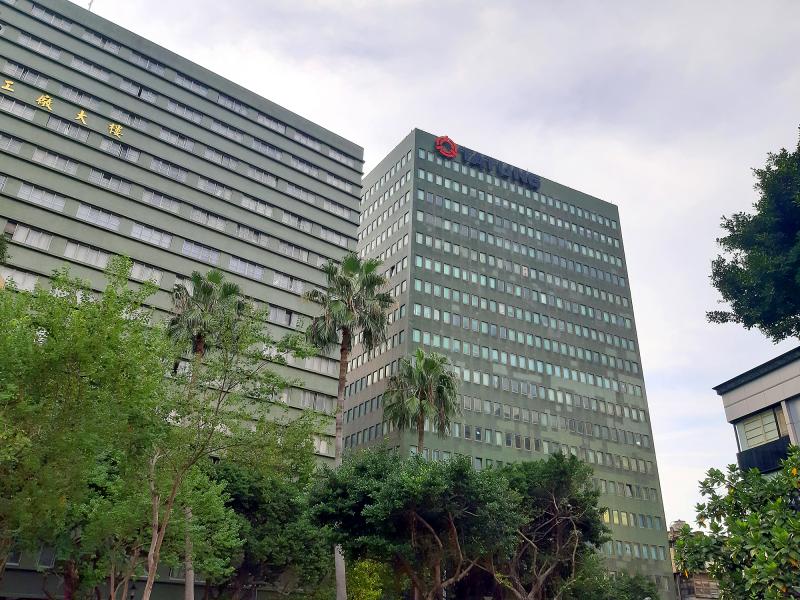Tatung Co’s (大同) board of directors on Monday appointed an executive director of industrial computer manufacturer Advantech Co (研華) to serve as the company’s president, replacing an incumbent who came on board just six months ago.
Chaney Ho (何春盛) is to replace Chung Yi-wen (鍾依文), who took office in December last year, Tatung said.
Chung, a former executive at Hon Hai Precision Industry Co (鴻海精密), is to be reassigned to head a Tatung subsidiary, it said.

Photo: CNA
Ho is a graduate of Tatung University and got his start in the television design department at Tatung before cofounding Advantech.
“We want to return to Tatung the brand, and restore the spirit of the ‘Tatung Boy’ (大同寶寶),” Ho said, referring the company’s iconic mascot, created during the height of its fame as one of Taiwan’s biggest and most profitable conglomerates.
Advantech said in a press release yesterday that Ho would be leaving with Advantech’s “full blessing and deep well-wishes.”
“We hope that through this connection, Advantech will have more opportunities to work with Tatung, especially in the realm of energy, automation and industrial Internet of Things,” the release said.
Ho is to remain a part of the Advantech board, it added.
After being embroiled in years of corporate scandal, control of Tatung was last year wrested from the founding Lin (林) family, with the chairmanship briefly going to Eastern Broadcasting Co (東森電視) chairman Lin Wen-yuan (林文淵), not related to the Lin family, in early November.
Lin Wen-yuan was dismissed in late December after just 50 days on the job, and replaced by Lu Ming-kuang (盧明光), former chairman of Sino-American Silicon Products Inc (中美晶), with the backing of Shanyuan Group (三圓建設) chairman Wang Kuang-hsiang (王光祥).
Lu came out of retirement to chair Tatung, which is in dire financial straits after years of mismanagement.

With an approval rating of just two percent, Peruvian President Dina Boluarte might be the world’s most unpopular leader, according to pollsters. Protests greeted her rise to power 29 months ago, and have marked her entire term — joined by assorted scandals, investigations, controversies and a surge in gang violence. The 63-year-old is the target of a dozen probes, including for her alleged failure to declare gifts of luxury jewels and watches, a scandal inevitably dubbed “Rolexgate.” She is also under the microscope for a two-week undeclared absence for nose surgery — which she insists was medical, not cosmetic — and is

CAUTIOUS RECOVERY: While the manufacturing sector returned to growth amid the US-China trade truce, firms remain wary as uncertainty clouds the outlook, the CIER said The local manufacturing sector returned to expansion last month, as the official purchasing managers’ index (PMI) rose 2.1 points to 51.0, driven by a temporary easing in US-China trade tensions, the Chung-Hua Institution for Economic Research (CIER, 中華經濟研究院) said yesterday. The PMI gauges the health of the manufacturing industry, with readings above 50 indicating expansion and those below 50 signaling contraction. “Firms are not as pessimistic as they were in April, but they remain far from optimistic,” CIER president Lien Hsien-ming (連賢明) said at a news conference. The full impact of US tariff decisions is unlikely to become clear until later this month

GROWING CONCERN: Some senior Trump administration officials opposed the UAE expansion over fears that another TSMC project could jeopardize its US investment Taiwan Semiconductor Manufacturing Co (TSMC, 台積電) is evaluating building an advanced production facility in the United Arab Emirates (UAE) and has discussed the possibility with officials in US President Donald Trump’s administration, people familiar with the matter said, in a potentially major bet on the Middle East that would only come to fruition with Washington’s approval. The company has had multiple meetings in the past few months with US Special Envoy to the Middle East Steve Witkoff and officials from MGX, an influential investment vehicle overseen by the UAE president’s brother, the people said. The conversations are a continuation of talks that

CHIP DUTIES: TSMC said it voiced its concerns to Washington about tariffs, telling the US commerce department that it wants ‘fair treatment’ to protect its competitiveness Taiwan Semiconductor Manufacturing Co (TSMC, 台積電) yesterday reiterated robust business prospects for this year as strong artificial intelligence (AI) chip demand from Nvidia Corp and other customers would absorb the impacts of US tariffs. “The impact of tariffs would be indirect, as the custom tax is the importers’ responsibility, not the exporters,” TSMC chairman and chief executive officer C.C. Wei (魏哲家) said at the chipmaker’s annual shareholders’ meeting in Hsinchu City. TSMC’s business could be affected if people become reluctant to buy electronics due to inflated prices, Wei said. In addition, the chipmaker has voiced its concern to the US Department of Commerce